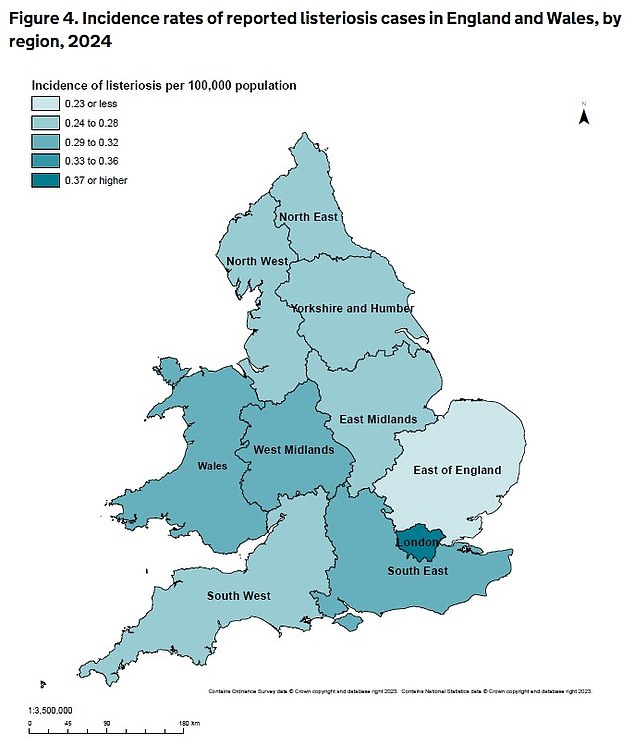A high street chain has been forced to recall three of its chicken products after a deadly bacteria that can cause meningitis was found in the meat.
Spar’s fillets had tested positive for Listeria monocytogenes – a bug that causes food poisoning.
Customers have been urged to not eat the food and return them to the store they were brought from for a full refund.
SPAR Enjoy Local Cooked Chicken Pieces 150g, SPAR Enjoy Local Cooked Chicken Slices 150g and SPAR Enjoy Local Cooked Chicken Fillets 300g were all at risk.
They all share batch code 5126 and the use by date is May 21, 2025.
Shops that sold the products would also be displaying posters to warn their customers about the contamination.
Listeriosis – which is a rare infection caused by the bacteria – typically includes symptoms like a high temperature, aches and pains, chills, vomiting and diarrhoea.
But those who are at higher risk, like babies, the elderly and people with compromised immune systems, are more likely to face life-threatening conditions like sepsis or meningitis.

Spar has been forced to recall three of its chicken products after a deadly bacteria that can cause meningitis was found in the meat

SPAR Enjoy Local Cooked Chicken Pieces 150g, SPAR Enjoy Local Cooked Chicken Slices 150g and SPAR Enjoy Local Cooked Chicken Fillets 300g were all at risk

Those who eat food containing listeria develop an infection called listeriosis, which can cause a fever, aches and pains, chills, nausea, sickness and diarrhoea
There is also a risk of miscarriage or stillbirth in pregnant women who catch listeriosis.
For most people, mild listeriosis gets better over a few days and can recover at home but high risk patients may need antibiotics and should speak to a doctor immediately.
The recall alarm comes only days after surveillance programmes that monitor levels of listeria in England and Wales suggested cases have soared to their highest level in eight years.
Figures show officials received 179 lab-confirmed reports of listeriosis in 2024, including 28 deaths.
It means cases are almost a fifth above levels seen pre-Covid.
Pre-packaged sandwiches, smoked fish, garlic sausage and chilled desserts were blamed for seven outbreaks last year, UK Health Security Agency (UKHSA) bosses said.
Last May, two adults died from the bug in an outbreak linked to contaminated sandwiches, rolls and wraps.
Earlier this year, officials also revealed three people died in 2024 following an outbreak of listeria linked to chocolate and strawberry desserts supplied to NHS hospitals.

Pre-packaged sandwiches were blamed for listeriosis outbreaks last year, UK Health Security Agency (UKHSA) bosses said. Pictured, a selection of sandwiches sold by Bread Spread which were recalled last year over fears they were contaminated with the bug

Earlier this year UKHSA bosses also said the three deaths and two cases linked to chocolate and strawberry mousses made by Cool Delight Desserts last year were all aged between 68 and 89

London recorded the highest number of listeriosis cases last year at 35, with an incidence rate of 0.39 per 100,000 people. The South East (30), Wales (10) and West Midlands (18) followed with incidence rates of 0.32, 0.32 and 0.3 per 100,000 people respectively
According to the new UKHSA figures, around a fifth of all infections in 2024 (37) were associated with pregnancy, of which more than 40 per cent resulted in stillbirth or miscarriage.
London recorded the highest number of listeriosis cases last year at 35, with an incidence rate of 0.39 per 100,000 people.
The South East (30), Wales (10) and West Midlands (18) followed.
By comparison, the East of England recorded the lowest (15), at a rate at 0.23 per 100,000 people.
Prepackaged sandwiches and the chocolate strawberry mousses accounted for 10 cases in total, UKHSA officials also said.
Last year, safety regulators recalled more than 25 types of sandwiches, rolls and wraps made by Bread Spread due to a listeria outbreak, warning the lunchtime offerings were not manufactured ‘in accordance with food law requirements‘.
Two people who had underlying health issues also died following the outbreak, health chiefs said.
The Food Standards Agency (FSA) said: ‘SPAR is recalling several chicken products because Listeria monocytogenes has been found in the products.
‘If you have bought the above products, do not eat them. Instead, return the products to where they were bought for a full refund.
‘Any customers with queries or concerns can contact SPAR Customer Services on 0289 034 2733.
‘Symptoms caused by this organism can be similar to flu and include high temperature, muscle ache or pain, chills, feeling or being sick and diarrhoea.
‘However, in rare cases, the infection can be more severe, causing serious complications, such as meningitis.
‘Some people are more vulnerable to listeria infections, including those over 65 years of age, pregnant women and their unborn babies, babies less than one month old and people with weakened immune systems.’













